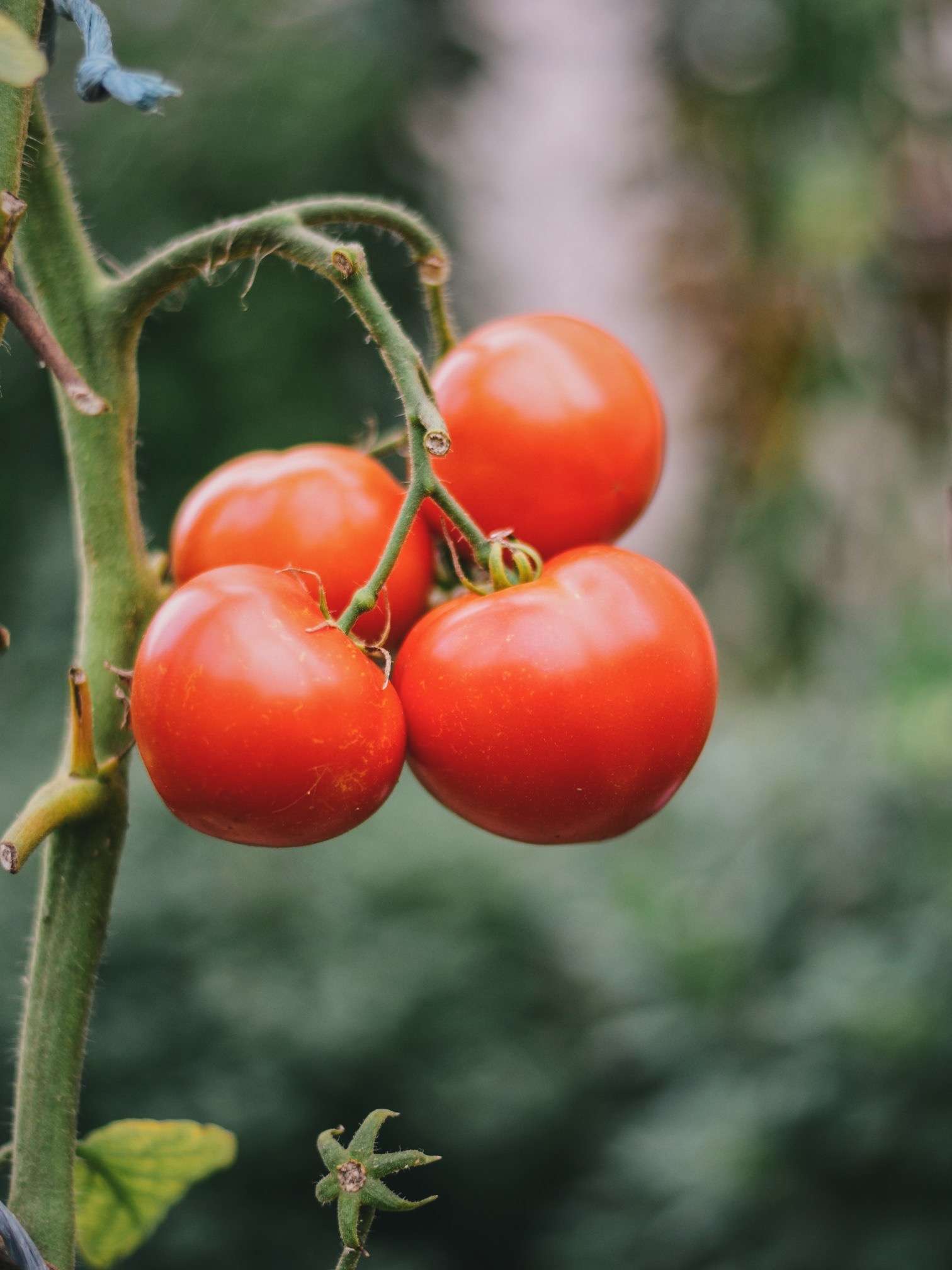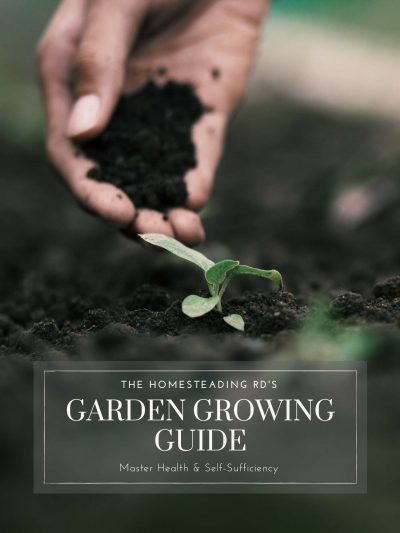If you’ve ever pondered, “do deer eat tomatoes?” you’re not alone. There’s nothing worse than tending to your precious plants for months, to have them demolished by a hungry deer just before harvest. Argh!
In this blog post, we will delve into the fascinating world of deer feeding behavior and explore whether tomatoes are on their menu. Plus, I’ll provide valuable insights to help you protect your precious tomato plants from these graceful, yet voracious, herbivores.
Let’s jump in!
*Disclosure: This post may contain affiliate links to products (including Amazon). I’ll earn a small commission if you make a purchase through my link, at no additional cost to you! Regardless, I only link to products that I personally use on our homestead or believe in.
Do Deer Eat Tomatoes and Tomato Plants?
The short answer is yes, deer certainly can (and will) eat your tomatoes and tomato plants! Thankfully, tomatoes and tomato plants are not their preferred food source, so if there are tastier things around (like your lettuce, strawberries, and sweet corn!), they will go for those instead.
So, you’re best off engaging in some protection strategies around your garden to save your tomatoes and your other tasty plants. Keep reading to find out what these strategies are!
How to Tell if Deer Are Eating Your Tomatoes
Deer are by far the largest animal that will prey on your garden, so their effects are easy to pick out!
Here’s what to look for:
- Large, rough bite marks, rather than sharp nibbles (they only have incisors on their lower jaw)
- Damage higher up on the plant since deer are fairly tall
- Uprooted plants as they pull and tear
- Trampled surrounding plants
- Hoof prints in the garden
Are Tomato Plants Toxic to Deer?
While tomato plants are not inherently toxic to deer, the leaves and stems of tomato plants contain alkaloids (solanine and tomatine) which can be toxic in large quantities.
However, the levels in ripe tomatoes are pretty low and not likely to pose a significant health risk to deer. It’s still best to protect your tomato plants so that you get a bountiful harvest and that the deer don’t risk filling their bellies with leaves and stems.
What Other Plants Do Deer Eat?
Deer are natural herbivores and graze on a variety of crops, trees, grasses, vegetation, acorns, and nuts. They spend much of their day munching on whatever they can find, which can be up to 12 lbs of food per day!
Here are some of their favorites:
- Acorns
- Aspen
- Berry bushes
- Corn
- Goldenrod
- Honeysuckle
- Maple
- Poplar
- Sumac
- …just to name a few!
6 Tips to Keep Deer From Eating Your Tomatoes
Deer are common thieves in the garden, so let’s talk about some strategies to keep them from eating your tomatoes (and everything else)!
#1: Fencing
Adding fencing to your garden is a must-have item, in my opinion! It not only helps to keep the deer out, but it will keep rabbits, digging neighborhood dogs, and raccoons out as well. Fencing also provides some level of privacy, which is always appreciated.
Permanent Fencing
This is the type of fencing that you likely think about when you consider garden fencing. It’s nice in that you only have to install it once, however, it has some drawbacks. First of all, the materials can be quite expensive and labor-intensive to install. Plus, you have no room to expand your garden in later years.
Temporary Fencing
Electric poultry netting is my favorite kind of fencing and is what I use around my large back garden! It works like a dream. It’s easy to set up and take down, packs down neatly, and it’s SUPER effective at keeping all of the critters out.
I also love that I can change the shape of the fencing each spring as I inevitably expand the garden. You can even run it with solar power if you’d like!
*While, yes, deer can easily jump a 4-foot fence, I’ve been using this electric fencing for 8 years now and have never had an issue. We have A LOT of deer around, too!
The Homesteading RD's Product Picks | |
Installs in approximately 15 minutes and is easy to create whatever unique shape you need! Effectively repels deer, racoons, rabbits, you name it! This unit will certainly keep your garden safe. | |
I use this unit to power the electric poultry netting and it works very well! It sends out electric pulses and is strong enough to power 25 miles of fencing! | |
#2: Predator Eyes
Deer are natural prey to several larger predators such as coyotes, cougars, bobcats, wolves, and bears. You can capitalize on this by scaring them away with some glowing predator eyes. I use them around my chicken tractor as well!
The Homesteading RD's Product Picks | |
This is THE best deterrent light on the market. It is a bit more expensive, but you only need one with the 360 degree radius coverage from 9 LED bulbs that reach up to 1 mile away. It also has a random flashing pattern, making it exceptionally effective. Waterproof, powered by a 6V battery and automatically turns on at night. | |
If you are looking for an inexpensive & simple option, these solar-powered lights are excellent! Sold in packs of 2 and 4 (you will need more than 1 since these lights are directional). They store up power during the day, then start flashing at night. | |
#3: Motion-Activated Sprinkler
Using a motion-activated sprinkler is a great way to spook deer (or any other critters) out of your prized garden! Simply adjust the sprinkler head detector to face the oncoming traffic and it’ll pick up a 1600-square-foot area! Super neat!
The Homesteading RD's Product Picks | |
There are a few of these on the market that are cheaper, but don't waste your money! This is the most reliable one out there with day AND night settings, plus 1600 sq feet of coverage. | |
#4: Companion Planting
Adding some plants around your tomato plants that deer detest is another great strategy to keep them out! Deer aren’t super picky, but there are a few things that they can’t stand.
Plants that deter deer:
- Toxic plants: Daffodils, foxglove, monkshood, poppies
- Highly fragrant plants: Sage, mint, garlic, salvia, lavender, peonies, bearded irises
- Fuzzy or thorny plants: Roses, lamb’s ear, spirea
#5: Deer-Repellent Sprays
Speaking of highly fragrant plants, we can utilize that to our advantage in a potent spray! This deer-repellent spray features mint oil and garlic oil (chemical-free!). It’s oil-based so it won’t wash away every time it rains, either.
The Homesteading RD's Product Picks | |
Deer Out is effective at repelling deer while being environmentally friendly using only natural ingredients. Safe for use around children and pets. 100% money-back guarantee! | |
#6: Ultrasonic Deer Repellents
While humans can’t hear ultrasonic sounds, deer sure can and they can’t stand it! You can utilize ultrasonic pest repellers that kick on anytime a critter enters the vicinity. They’ll turn around and head in the other direction in no time!
The Homesteading RD's Product Picks | |
This effective device helps you to get rid of unwelcome animal visitors! It contains a motion detector system that detects movements and emits powerful ultrasonic sound white a flashing LED light. | |
Other Gardening Articles You’ll Love:
- How to Use Neem Oil on Tomato Plants
- Growing Tomatoes in Grow Bags: A Comprehensive Guide
- The 5 Best Soil pH Testers
Final Thoughts
Although tomato plants may occasionally fall victim to hungry deer, there’s no need to panic. By implementing preventive measures like installing fencing, motion-activated sprinklers, or incorporating companion plants, you can significantly reduce the chances of deer munching on your tomato plants.
*Are you interested in starting a garden but overwhelmed with where to start? Or maybe you’ve tried a park in the past, but it flopped? Definitely check out my course How to Plan a Garden: Step-By-Step!
*Information in this article was referenced from personal experience and/or from my favorite gardening book: The Vegetable Gardener’s Bible, unless otherwise noted.
The Homesteading RD's Product Picks: | |
This is THE gardening book to have! I've had my copy for over 10 years and it's the one that I keep going back to time after time. It provides design ideas for raised beds, compost bins, you name it! Plus helpful tables for pH ranges, companion plants and more. | |














That’s interesting! I had no idea deer would eat tomatoes. I live in an area with a lot of deer traffic and will have to keep this in mind for my garden. Thanks for the tips!
Definitely be prepared for it! Those deer are quite the scavengers!
Ammonia in an open container keeps deer and all animals away